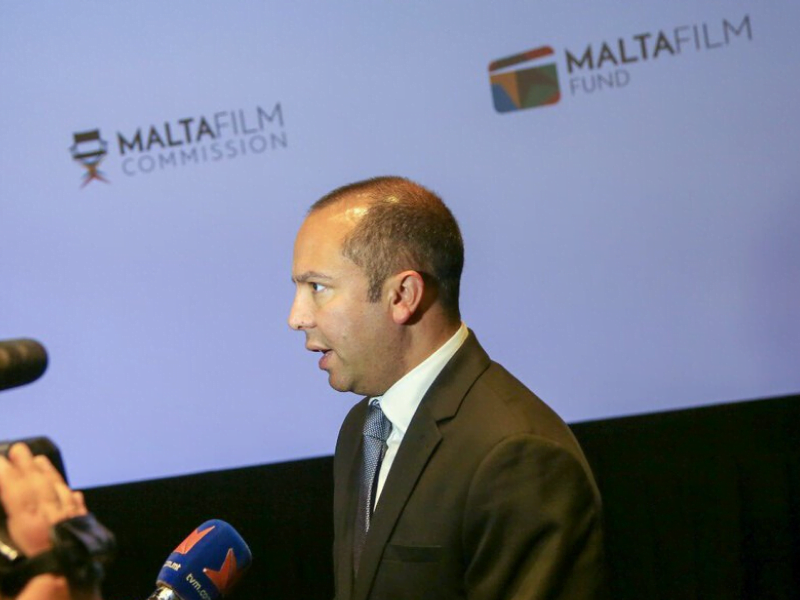A foreign filmmaker has accused the Malta Film Commission (MFC) of gaslighting him and withdrawing a €20,000 grant for including four seconds of footage referring to murdered journalist Daphne Caruana Galizia in a crowdfunding video.
The filmmaker reached out to The Shift to highlight the unfairness of the situation, which left him searching for other means to replace the withdrawn funds, which were promised in 2018.
“We now have to work harder to replace the funds that MFC pulled for us to make the film. This is wrong on so many levels. I will not give up because this is a story worth telling; this is a story which I believe in; this is a story that needs to be told,” the filmmaker, who wants to remain anonymous, told The Shift.
This is another in a series of complaints and mounting criticism against Malta Film Commissioner Johann Grech, after The Shift revealed foreign film producers were being given a selective list of suppliers in Malta.
Two weeks ago, the Malta Producers Association filed a judicial protest against Grech, arguing that despite revelations that Grech was “abusively promoting” a select group of service providers to international film producers, no action was taken.
The Shift revealed – and published – the list of select companies that the Malta Film Commission was sending out to foreign film producers, which shows seven companies out of a list of 22 companies in 2018.
“I won’t be sad to see Grech resign. And while I’ve had only wonderful experiences in Malta and with the hardworking members of the Maltese film community, I also can’t imagine referring any other foreign filmmakers to the Malta Film Commission, who have proved to me that they are unprofessional, corrupt and vindictive,” he told The Shift.
He explained that he decided to write a script for his short narrative film set after “getting so inspired” when visiting the island. He teamed up with a local production company and applied for Malta Film Fund’s Short Film Production Grant.
They eventually received feedback from the evaluation panel, which he described as “overwhelmingly positive support” for the project.
The team started preparing and, in January 2019, he visited Malta to set up auditions, interview crew, scout locations, and shoot footage for a crowdfunding campaign to supplement the film fund grant.
“I launched a crowdfunding campaign, which featured a video pitch outlining the project and our need for additional funds. In the video, using the exact same language from my Malta Film Fund grant application and pitch to the evaluation panel, we showed four seconds of imagery related to Caruana Galizia’s assassination under voiceover outlining the themes of my film: ‘corruption, environmental degradation, and the migrant crisis’,” he said.
Soon after the crowdfunding campaign was launched, one of the producers informed him that he had been contacted by Grech, who “didn’t sound happy at all with the fact that in the video we mentioned corruption and showed images of Caruana Galizia. He told me that he will be referring the case to the Malta Film Fund Board and that he will be asking them to make a decision about it as there was no reference whatsoever to this in the application”.
Even though he felt censored, they removed the video and replaced it with one without any mention of corruption and the images of Caruana Galizia.
“I now understand that the combination of this imagery with the text from my original submission might possibly have been indelicate. However, the script does not and never has had any reference to Caruana Galizia or to her assassination”.
He pointed out that he wanted to create a context for people who might have heard about Caruana Galizia’s assassination through the news or when she was mentioned by American actress and human rights activist Meryl Streep.
The crowdfunding campaign was a huge success but came with bad news in the form of a letter from the Malta Film Commission informing them that the grant was revoked.
“Following their viewing and assessment of the publicly available video, the Evaluation Panel feels that the story of the short film outlined in this video departs precariously from your original submission and, clearly, does not reflect at all what was presented in the application on which their judgment had been based,” the letter said.
The filmmaker said this was an extraordinary statement especially since the story had not changed at all since his original submission. “Instead, I hoped to draw a thematic link between Caruana Galizia’s assassination and violence against women, a central theme of my film.”
They tried appealing but were told the decision was final. “The grant was revoked because of the reference to Caruana Galizia’s murder in a clear act of State censorship,” he said.












